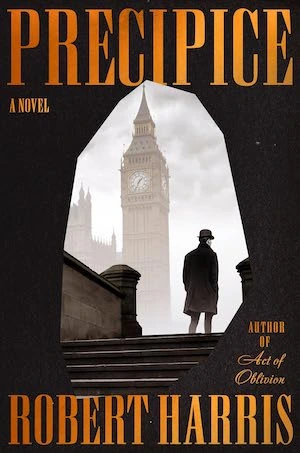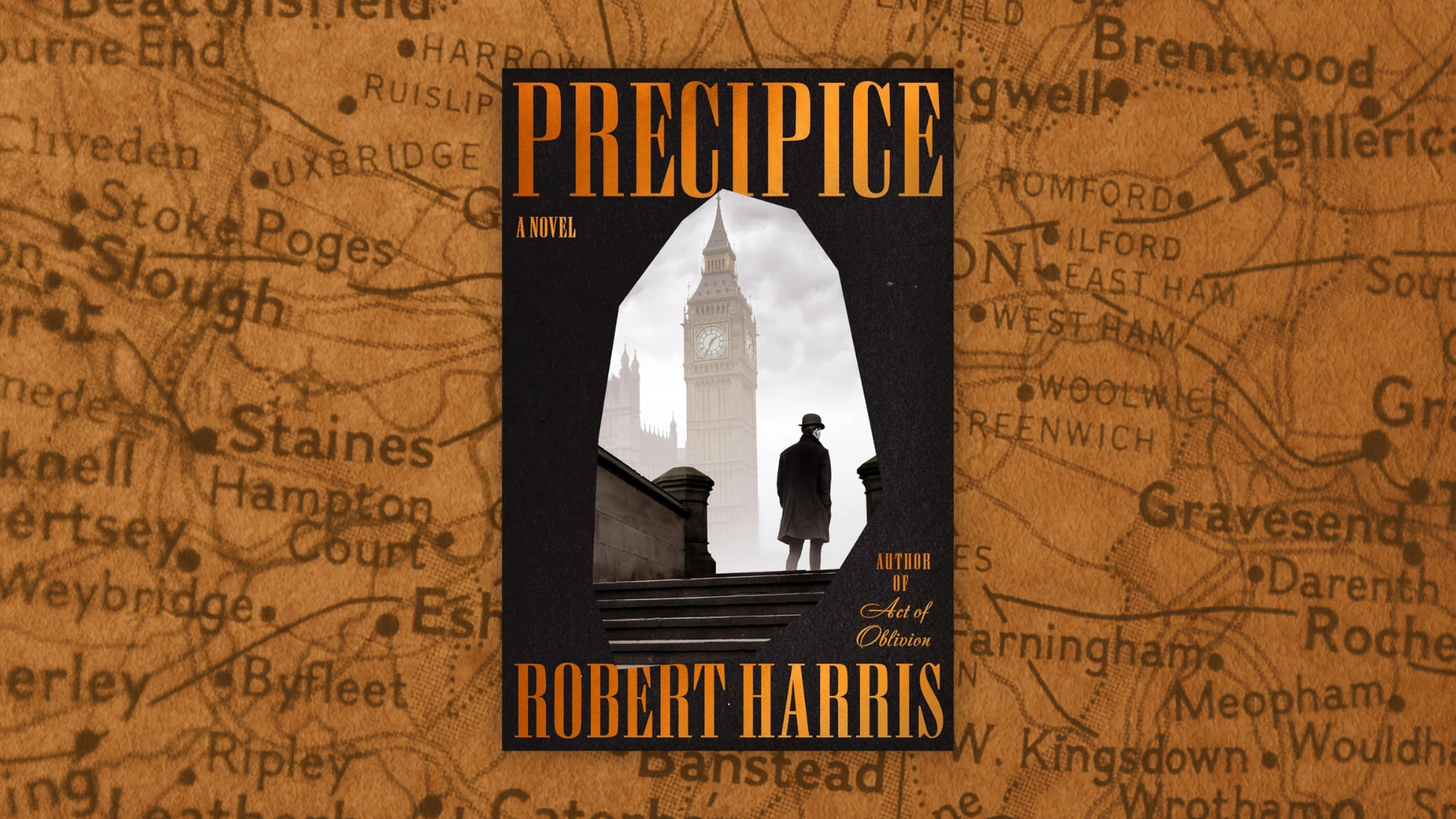Precipice by Robert Harris
Robert Harris, best-selling author, television correspondent and journalist for the Sunday Times and Daily Telegraph has written Precipice, an exceptional work of historical fiction. It is a stunning, revelatory and utterly fascinating account of the secret largely epistolary love affair between Liberal Party Prime Minister H.H. (Henry Herbert) Asquith and Venetia Stanley, a 35 -years-younger socialite from a prominent and wealthy family.
Their clandestine correspondence and romance began in 1912 and concluded almost three years later when in May, 1915, Venetia told him of her engagement to Edwin Montagu, his friend, Member of Parliament and Cabinet member first as Under-Secretary of State for India, next as Financial Secretary to the Treasury. Asquith declared he was “utterly heart-broken” and ended their frequent correspondence. The Britannica Dictionary defines Precipice as “1) a very steep side of a mountain or cliff and 2) a point where danger, trouble, or difficulty begins.” This Prime Minister had a narrow escape on the brink of disaster and disgrace. It is certainly neither unusual nor uncommon for a young woman to be attracted to a powerful older man nor is it particularly noteworthy for an influential politician to have flirtations, flings and affairs. However, to have a man of 60 so besotted as to betray military and state secrets to his beloved mistress during wartime was tantamount to treason. His reputation would have been destroyed and the outcome of the war could have been endangered if the secrets had been divulged. Instead of Rule, Britannia, it might have been Heil, Germania had Venetia Stanley not been an absolutely trustworthy keeper of secrets and loyal subject to the Crown.
Combines Real History and Fictionalized Accounts
Robert Harris focused on the events leading up to WWI beginning Precipice in the summer of 1914 and concluding it with the end of the affair in mid-1915. Extensive quotations from the letters compulsively written by H.H. Asquith are included. These are authentic as are the telegrams, newspaper articles and official documents cited. The correspondence from Venetia Stanley mentioned in his letters is not extant; likely burned by Asquith himself. Thus her responses are fabricated by the author’s vivid imagination to provide balance.
Further embellishing the intrigue, the author invented a key character, Paul Deemer, a courageous young intelligence officer with Scotland Yard who is tasked with investigating a leak in secret documents. He uncovers a shocking sexual intrigue that is a matter for national security and goes undercover to intercept and copy their correspondence. Fact and fiction are seamlessly blended in this exciting thriller.
Sharing Sensitive Government and Military Information
H.H. Asquith, the most powerful man in the United Kingdom, second only to King George V, did share sensitive telegrams, letters and Cabinet discussions containing top-secret information about troop placements, battle plans and armaments with Venetia. By startling contrast, some Cabinet, naval and military commanders were not as well informed.
In chatty, gossipy love notes he wrote openly about England’s leadership including Winston Churchill, Lord Kitchener, David Lloyd George and others and the political intrigues and rivalries between them. Had H.H. Asquith’s correspondence with Venetia Stanley come to light during his term of office, it would have been an explosive bombshell of a political sex scandal that would have overshadowed any of the known extramarital relationships involving Prime Ministers or Members of Parliament and rocked the very foundation of the government.
British mail was the probably the most efficient in the world in the mid-19th to early 20th century. With the introduction in 1840 of the Penny Black, the world’s first adhesive postage stamps, letters could be dropped in any post box or left for pickup in homes and offices with mail efficiently delivered an astounding twelve times daily. The PM wrote obsessively to Venetia, as often as two or three times daily, complaining in successive letters if she failed to promptly respond.
The worldwide conflagration and war efforts troubled by insufficient munitions and the shocking daily death toll of UK’s soldiers entrenched on the front lines was sadly not receiving the attention it required of him. The Gallipoli Campaign was becoming a monumental slaughterhouse and military disaster. Asquith also seemed oblivious to serious issues at home such as the increasing violent demands for Irish Home Rule and Women’s Suffrage. During debates in the House of Commons and in Cabinet meetings he was observed to be blithely scribbling away.
Friday afternoons were reserved for two hour or more carriage rides with Venetia with blinds drawn to mask private conversations. He openly mooned over her like a lovesick schoolboy at balls and house parties while being protected by their families and social set that were not blind to the circumstances.
Ancestors of the Bonham Carter Family
Robert Harris acknowledges a debt of gratitude to the Bonham Carter Family and fellow trustees of the documents for permitting him to quote from Asquith’s letters. Dr. Mark Potter who is working on publication of Margot Asquith’s pre-war journals also provided him access to his work.
There are 8 boxes containing 560 letters to Venetia, some 300,000 words, archivally maintained at the Oxford University Bodleian Library which only came to light in 1963, 15 years after Venetia Montagu’s death. His daughter Violet Bonham Carter had been unaware of their existence and fervently wished to protect and preserve her father’s reputation. The literary rights are retained under the control of the Bonham Carter Family. Family friend Roy Jenkins was allowed access with certain omissions stipulated when he wrote H.H. Asquith’s biography, published in 1964. Oxford University Press published approximately half of the edited letters in 1982.
Precipice is a thrilling, effective novel which may stimulate the curious to read more about the persons involved, World War I and other events of the era. To that end, Robert Harris has included a brief but fine bibliography. Almost surprisingly, the author did not criticize the errant Prime Minister for his tender affections towards Venetia (and previous intrigues) but focused on his woeful inattention to crucial wartime affairs of state.
A History of the Asquith Family
Herbert Henry Asquith, b. September 12, 1852, d. February 15, 1928
H.H. Asquith, leader of the Liberal Party was considered to be the founder of the welfare state in England. He served as Prime Minister of the United Kingdom for nearly 9 years from April 5, 1908 until December 5, 1916 during which time he was responsible for the Parliament Act of 1911 that reduced the power of the House of Lords. He was a brilliant scholarship student at Oxford University, an exemplary orator who served as a barrister before beginning his political career. H.H. enjoyed the earthly comforts of fine foods and a conspicuous fondness for drink that earned him the sobriquet “Squiffy.”
His long affair with Venetia Stanley was not his first but was significant as she was likely the woman he most loved. His first marriage to Helen Kelsall Melland, a physician’s daughter, ended after 14 years when she died of typhoid fever while they were on holiday in Scotland. He was left with five young children to raise: Raymond, Herbert, Arthur, Violet and Cyril.
Eldest son Raymond, an exemplary scholar and barrister, at age 36 with a wife and three children under the age of 7, was commissioned in December, 1914 as a second lieutenant in the 16th Battalion. With his strong sense of patriotism, he requested to be transferred into active duty and was killed in action at the Somme on September 15, 1916.)
An Aristocratic, Social Family
Less than 3 years after Helen’s death, H.H. married Margot Tennant, 12 years his junior. She was an aristocratic, intellectual woman and a superb hostess known for her gossipy wit and glamour though not great beauty. She brought a substantial private income along with entry into the highest echelons of society. After a somewhat deprived childhood, he embraced the good life as if to the manor born, savoring lively conversations and the full assortment of social events available to those with ready funds.
Margot bore him five children but only two survived. Elizabeth grew up to marry a Romanian prince while the youngest family member Anthony became a well-regarded film director. Margot was warned by her physician another pregnancy could kill her and ceased sexual relations with her husband leading to separate bedrooms and carte blanche to discreet affairs. His sons with Helen were in boarding school or university and seldom under the same roof as Margot who fit the wicked stepmother cliché with her frequent clashes with Violet.
It was through his beloved daughter Violet that H.H. met Venetia Stanley. The two girls were the same age and became nearly inseparable best friends when they met in 1905 during their first season as debutantes. Venetia was the spoiled youngest of seven children of the fabulously wealthy Stanley family who owned three large estates. One country home contained sixty bedrooms. She was confident, self-possessed, tall and slim with a fine wardrobe. Hers was an arresting face rather than one of classic beauty. Venetia was highly intelligent, deeply interested in politics and possessed a great sense of adventure.
The two young women were members of a “fast” crowd known as “The Coterie” who drank, smoked cigarettes, occasionally gambled, used drugs, and were in a continual social whirl enabled by their social positions and family wealth. Beginning in 1909, Violet and Venetia accompanied H.H. and often Edwin Montagu on long holidays while Margot stayed behind with the two youngest children. Asquith doted on his daughter and her girlfriends and even Margot referred to them as his “little harem.” H.H. Asquith confessed in an early letter that he suddenly fell in love with Venetia in 1912 while they were on vacation in Sicily with daughter Violet and his chum Edwin.
Results in a Distinguished Family Line
Precipice is such a fascinating revelatory novel, one might wish Robert Harris had added to the readers’ curiosity and pleasure by including a long chapter devoted to the singular Violet Asquith. She was a force of nature in her own right, a lifelong close friend of Winston Churchill, enamored with the handsome poet Rupert Brooke who died tragically from sepsis caused by a mosquito bite.
On November 30, 1915, she married Maurice Bonham Carter known as “Bongie” with whom she had four children. Violet had known him for years as he was a family friend and served as her father’s Principal Private Secretary. Violet, ever active in liberal politics, was a fervently outspoken anti-fascist, supporter of the arts, noted biographer and diarist. In 1964, she was created life peer Baroness Asquith of Yarnbury by Queen Elizabeth II.
The Bonham Carter distinguished family line includes notable actresses’ granddaughter Helena Bonham Carter and great-granddaughter Anna Chancellor. In 1969, Lady Violet Bonham Carter died of a heart attack at the age of 81. It is unlikely she would have approved of the perceived criticism of her beloved father but readers are certain to enjoy Precipice.


 Robert Harris
Robert Harris 

